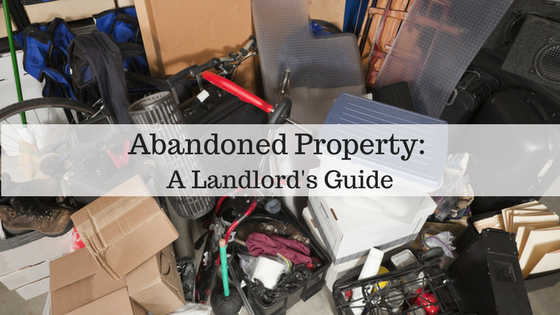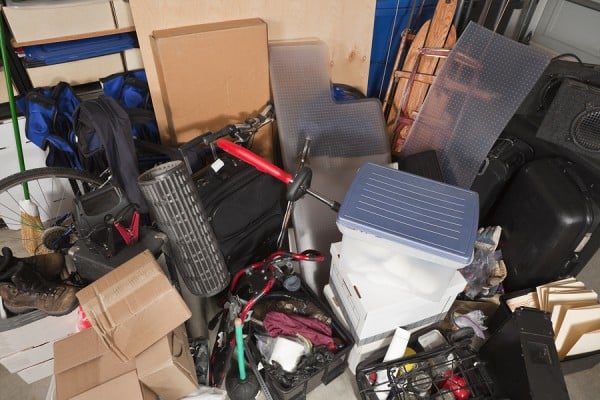
Tenant turnover is a time consuming, and often expensive, process for landlords. A move-out inspection will reveal the condition of your property upon vacancy, which every landlord hopes is the same as the start of tenancy. While every landlord will cringe at the amount of cleaning a rental unit may need, or any property damage the unit received during the lease term, another turnover situation one might encounter is tenant property that has been left behind.
Each state has different specifications about how a landlord or manager may handle tenant property that has been left behind in a rental unit upon vacancy. Below you will find a general guide about how to manage abandoned tenant property but you should always check with your state and local laws to find out what is required in your region for handling tenant property left at a vacated rental property.
What is tenant property?
Tenant property is considered any personal possessions or belongings owned by your tenant – this includes anything that was brought into the rental unit by your tenant or their guests including clothing, furniture, electronics, vehicles, etc. When a tenant moves out, they are required to also move out their personal property in order to restore the property back to the condition it was upon moving in. In some cases, tenants will fail to take all their items with them upon vacating the property, leaving the landlord to deal with the mess.
Although you might be tempted to sell, keep, or throw away everything your tenant left behind in your rental unit, there are certain procedures a landlord must follow in order to avoid liability claims or legal proceedings from the tenant.
Establish the reason for moving
Tenant property that is left behind at the end of a lease term is handled differently than tenant property that is left behind as the result of an eviction. A landlord can sometimes handle tenant property differently if he has written confirmation that the tenant will not be returning to the residence to finish a lease term or claim abandoned property.
The procedures described below represents what to do when a tenant voluntarily vacates a rental property either due to end of tenancy, or when a lease is broken early.
What to do with abandoned tenant property?
Before a landlord disposes of a tenant’s abandoned property, certain steps need to be taken to reduce the risk of liability for damages to the landlord. A landlord is responsible for taking certain steps to store a tenant’s property without damaging it and give the tenant a reasonable amount of time to reclaim their property.
- Itemize all Tenant Property– Create a list of all the items your tenant left behind at the vacated rental unit. It is a good idea to take a photo or video of each item to show its condition, to protect you from any damages claims.
- Safely Store the Property – You must store the tenant’s abandoned property in a safe place until the tenant removes them or the required time period passes. Types of storage facilities used by landlords in this situation include the rental unit or a commercial storage unit, sometimes the landlord’s own garage or property can be used to safely store abandoned tenant property.
- Notify the Tenant(s) – Write a notice to all the tenants who could claim ownership of the property, delivered in person or by first class mail with a return receipt, that includes:
- The itemized list of property left at the rental unit, descriptive enough for your tenants to identify them.
- The deadline for claiming the property – timelines for claiming property are state specific and range from 5 – 45 days depending on the value of the items.
- Where the property is being stored
- The charge for storing the tenant’s property
- Information on what the landlord will do with the property if it is not claimed within the allotted timeline.
The process described above relates to abandoned tenant property Your state may have alternative requirements for how to handle apparently lost property, or property whose legal owner is unknown.
What happens when the tenant wants to claim the property?
If the tenant responds to your notice in an attempt to reclaim the abandoned property within the timeline, you must act in good faith to make the belongings available to the tenant at a reasonable time and place.
In most cases, a landlord may charge the tenant the costs associated with removing and storing the tenant’s property, as long as the price is reasonable and reflects fair market value.
What happens if the tenant does not respond or attempt to claim the property?
If the tenant does not claim the property or contact you to collect it, most states allow a landlord to sell the abandoned property at a public or private sale. A landlord can usually keep the reasonable cost for notice, storage, and sale from the proceeds of the sale. The remaining balance is then forwarded to the tenant or paid to the county, depending on your state’s rules.
If the value of the items is under a certain amount a landlord may simply throw away or give away the belongings; this amount set by your state’s landlord-tenant laws.
Exceptions to landlord storage requirements:
A landlord may immediately dispose of rotting food that once belonged to the tenant. And a landlord may allow an animal control agency or humane society to remove abandoned pets or animals. Special rules also apply to motor vehicles. Be sure to check with your state’s regulations on these types of abandoned property requirements.
Another exception related to managing tenant property pertains to property fixtures. If a tenant installed items attached to the walls or ceilings, like shelves, fans, bars or lighting, and leaves them behind, the fixtures become the landlord’s property. If the landlord does not want the fixtures, they may have the right to charge the tenant for removing and restoring the property to its condition prior to tenancy.
What if a landlord doesn’t follow the requirements for abandoned tenant property?
If a landlord fails to notify the tenant of the right to recover abandoned property or refuses to turn over the tenant’s belongings, the tenant has rights to file an action against the landlord.
What can a landlord do to avoid dealing with abandoned tenant property?
When a tenant vacates a rental unit, the last thing a landlord has time to do is go through the abandoned tenant property procedures described above. Collecting, itemizing, storing, notifying, and arranging to sell or dispose of the tenant’s property takes up a lot of time and energy for the landlord. The best way to avoid this situation is to screen potential tenants in order to find ones who have proven themselves to be responsible people and renters. Tenant screening should always include a background check to reveal financial responsibility and law-abiding behavior. Screening should also include a call to previous landlords who will have information about the condition an applicant left his previous rental unit upon vacating. If the previous landlord mentions abandoned property, that should be a red flag.
Landlords Need a Great Lease
A good lease agreement will have specific language about what is required of the tenant in terms of maintaining the rental property and returning it in the same condition it was received at the start of the lease term. You should always do a walk through and move-in inspection with your tenant at the start of tenancy so you are both on the same page about the condition at the time of occupancy and what you expect it look like when they move out. This includes removing any personal property.
Your lease should also include language about what you will do with any tenant property that is left at the rental property at the end of the lease term. When reviewing this section of the lease agreement with your new tenant, make sure they understand the charges they may incur related to removal and storage of any abandoned property. Providing a clear description of what happens to left behind tenant property in your lease gives you further legal ground should a tenant challenge you about removing or disposing of their abandoned personal property after the proper steps were taken.
Have you ever had to deal with abandoned tenant property at any of your rentals? What processes did you have to go through to manage the situation?
*This article is intended to provide general information about managing tenant property left at a vacated rental property, it should not be taken as legal advice. You should always consult a lawyer that is familiar with landlord-tenant laws in your state to find specific requirements you need to follow regarding tenant property.
